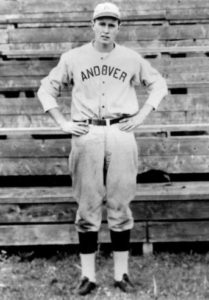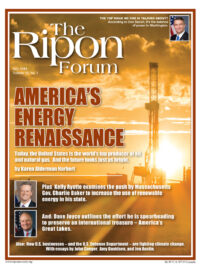
George H. W. Bush, America’s 41st President and likely the Nation’s most nonpartisan Chief Executive since Ike, was for most Americans a welcome time out. He liked to drive his cigarette boat, Fidelity, at the Bush family home in Maine. The President installed a horseshoe pit on the South Lawn of the White House and played to win but didn’t demand a mulligan.
Bush — “Poppy” after his grandfather’s “Pop” — was religious but not severe; humorous but not risqué. He was a fine husband, father, and grandfather. To learn about his World War II gallantry, which nearly took his life, you had to talk to others, as with most members of The Greatest Generation, which Tom Brokaw so concisely and precisely named.
On December 8, 1941, Bush — then 17 — tried to join the navy the day after the Japanese attacked Pearl Harbor. Spurned due to age, he got a diploma in 1942, enlisted the day he turned 18, got wings and his commission, and became the navy’s youngest aviator. Poppy trained in North Carolina, left for the Pacific Theatre to pilot an Avenger aircraft, was shot down in 1944, rescued at 20 by a submarine, the U.S.S. Finback.
It was during training in 1942 that Poppy met the man known today as “The Greatest Hitter Who Ever Lived.” Ted Williams played for the Red Sox for four decades, served in the Marines in both World War II and Korea, and was termed by Bush “John Wayne in baseball woolies.” The two veterans were loyal to one another in an endearing director John Ford sort of way.
Throughout his life, Bush never strayed far from the pastime, having first swung a bat at five. In 1991 the President coined an event typical of a man who invited others to coalesce. Chief of Staff John Sununu asked me to write a tribute to what both Ted and Joe DiMaggio achieved in 1941 — The Kid’s .406 average, and the Yankee Clipper’s 56-game hitting streak, respectively.
Bush never strayed far from the pastime, having first swung a bat at five.
“The President wants to celebrate ’em,” Sununu said. I would script Bush’s talk and text for each “President’s Award.”
“President’s Award?” I said. “When was it last given?”
“Never,” said Sununu. Nor has it been given since.
On July 9, I joined other Teddy-boppers in the Rose Garden to laud a generation — and a year. Bush praised DiMaggio’s “grace and modesty,” asked Williams for his “help with [his] press relations,” and then introduced the Boston Red Sox’s No. 9, who dominated the event.
“I’ve always realized what a lucky guy I’ve been in my life,” Williams said. “I was born in America.” He said he was “very, very proud” of having served his country and owed “so very, very much” to the game he loved. To Bush, he said, “You’re looking at one of the greatest supporters you’ll ever have.”
DiMaggio followed. Acknowledging the Louisiana State championship baseball players who were in the audience, he said simply, “I know the feeling.” Indeed, he did. His Yankees had won nine World Series.
Williams and DiMag and a whole generation built a grand America on a consensus of shared values—liberty, faith, work, democracy, and honor, among others.
Nos. 41, 9, and 5 — Bush, Williams, and DiMaggio respectively — then took Air Force One to a “summit” in Toronto with Canadian prime minister Brian Mulroney, arranged hurriedly so that Bush and friends could see that night’s All-Star Game. “The President cooked up the idea,” Sununu said, “so that these two legends would be on the airplane for ninety minutes just telling baseball stories. It was wonderful.”
A Red Sox–loving President, his Yankees-cleaving chief of staff, and two names synonymous with the Good War. Who wouldn’t listen, like disciples of Dylan Thomas, wanting more? Williams and DiMag and a whole generation built a grand America on a consensus of shared values — liberty, faith, work, democracy, and honor, among others. It did not come free.
Five months after his tribute to The Kid and Joltin’ Joe, Bush gave a speech aboard the U.S.S. Arizona memorial site to commemorate the fiftieth anniversary of Pearl Harbor. As much as anyone, Poppy grasped how memory bred unscripted love and unsummoned fear.
“Every fifteen seconds, a drop of oil still rises from the [sunken] Arizona,” he said as light reflected off the Pacific. “As it spreads across the water, we recall the ancient poet: ‘In our sleep, pain that cannot forget falls drop by drop upon the heart.’ It is as though God Himself were crying.” Profoundly wise, Bush knew that unity wrest a price far beyond being a noble prize.
Curt Smith is a former speechwriter for President George H. W. Bush and is currently a newspaper columnist, award-winning radio commentator, Upstate New York television political analyst, and acclaimed author. His latest book is, The Presidents and the Pastime: The History of Baseball and the White House.




